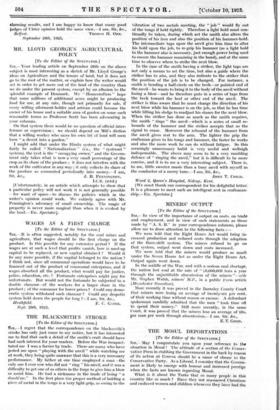THE BOUNDARY PROBLEM [To the Editor of the SPECTATOR.)
SIR,—Will you kindly grant me space to make the following observations on your article on the above subject ?
1. It is scarcely correct to state that " by a procedure -hitherto unknown to the Constitution we shall see the majority decision of a Commission operate to repeal in part an Act of Parliament." Such is not the case, because the 1920 Act was repealed by the British Parliament, exception only being made for a portion of it to remain applicable to " Northern Ireland," and such portion subject to certain very clearly defined -conditions (see Free State Constitution Act, 1922, Par. 1, Clause 1). The Commission was merely appointed to carry out the condition regarding it in the 1922 Act, which is to alter the Boundary—not the 1920 Act as you erroneously state.
2. There is no argument to support the contention that any alteration of the existing Boundary would cause irritation throughout the Dominions. Northern Ireland is not a Dominion and bears no analogy to any of the Dominions. It has neither the status nor any of the powers and privileges granted to them. Some of its services are completely con- trolled and administered by the British Government.
3. It is difficult to see how the right of the British Govern- ment to have legislated on this matter could be seriously questioned. The chief intention of the 1920 Act was the " Government of Ireland " and it was inevitable that, when the major portion became abortive, the Act should be repealed or modified to meet the new conditions, and it appears absurd to suggest that the British Parliament went outside their powers in doing so.
4. In view of the foregoing, it is difficult to discover the " legally strong " case (which you mention) which would support resistance either active or passive, to the putting into effect the decisions of the Commission. On the contrary, such course would appear to be entirely illegal and unconstitutional.
5. It is not apparent that a case, the completion of which is a desire to hold sections of people under a Government which they neither love nor respect, is a " morally strong " one, more especially if, after exhaustive enquiry regarding their wishes, they are transferred by an impartial Commission.
6. There is no ground for assuming that the counties Cavan, Monaghan and Donegal were abandoned for any purpose other than to obviate the possibility of their inclusion in Northern Ireland eventually resulting in that whole area voting itself into the Free State.
When we compare the words of the Covenant (which I confess I signed) in which we were to " defend our.cherished position of equal citizenship in the United Kingdom, and in using all means necessary " to that end, when we compare these words and the boastings of politicians who were to march to Cork with the subsequent peaceful evacuation of the three counties, can you blame me if I am sceptical when I hear all this talk of resistance, of Belfast bombarded and its shipyards in ashes ?
In conclusion perhaps I am over-optimistic, but writing as an Ulsterman who has lived all his lifetime in Ulster, as one who has had close association with Unionist organizations and with the Orange Order extending over many years— writing as such, I am convinced that when the time comes for readjustment of the Boundary line in accordance with the findings of the Commission (should no other solution have been found) the transfer of territories will take place without any alarming results, and I am happy to know that many good judges of Ulster opinion hold the same view.—I am, Sir, &c.,



























































 Previous page
Previous page